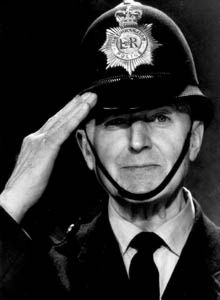

Beginning in 1955 and finally ending in 1976, Dixon of Dock Green was a popular series although its homeliness would later become a benchmark to measure the "realism" of police series such as Z-Cars and The Bill. The series was set in a police station in the East End of London and concerned uniformed police engaged with routine tasks and low-level crime.





The main character, Police Constable George Dixon, played by the late Jack Warner, was an old-style British "Bobby" (Policeman). The character first appeared in a 1950 British film by Ealing Studios, The Blue Lamp, in which he was shot and killed by a criminal called Tom Riley (Dirk Bogarde). However, it was decided to resurrect him for a television series, written by Ted Willis. The designer was Laurence Broadhouse.
If Dixon was known to the public, the actor Jack Warner was even better known. Born in London in 1895, Warner had been a Comedian in radio and in his early film career. Starting in the early 1940s, he broadened his range to include dramatic roles, becoming a warmly human character actor in the process. But as well as playing in films with dramatic themes, such as The Blue Lamp, Warner continued to play in comedies such as the successful Huggett family programmes on BBC Radio and films made between 1948 and 1953.
In Dixon of Dock Green, Dixon is a "bobby" on the beat – lowest-ranking policeman on foot patrol. With the inevitable heart of gold, Dixon was a widower raising an only daughter, Mary (Billie Whitelaw in early episodes, later replaced by Jeanette Hutchinson). However, in The Blue Lamp, Dixon has a wife named Em (Gladys Henson) and it is mentioned that their only son, Bert, was killed in the Second World War – hence Dixon adopts a paternal aspect towards PC Andy Mitchell (Jimmy Hanley), a young policeman on his first day.

Subtitled in the early days "Some Stories of a London Policeman", each episode started with Dixon speaking to the camera. He began with a salute and the greeting "Good evening all", which was changed to "Evening all" in the early 1970s, which has lived on in Britain as a jocular greeting. In similar fashion, episodes finished with a few words to camera from Dixon in the form of philosophy on the evils of crime, before saluting and wishing the viewers "Goodnight, all". At the end of a series, Dixon would tell the audience that he was "going on holiday for a few weeks" so that they wouldn't worry about not seeing him around.
Initially, Dixon continued in the same role as in the film The Blue Lamp, a constable based at the fictitious Dock Green police station in the East End of London, which replaced Paddington Green police station from the film. The character of Andy Mitchell, the young constable in the film who embarks on a perilous quest to find and bring Tom Riley to justice, became a detective named Andy Crawford (Peter Byrne), in the CID at Dock Green, and he was married to Dixon's 23-year-old daughter, Mary, in the 19th episode, Father in Law (1st Sept 1956). Dixon sings a few songs at the wedding and wishes the viewers goodbye at the end of the episode (this was the end of series 2 and series 3 was four months away). The couple moved to a flat in Chelmsford.

By the final years of the series in the 1970s, Warner was getting elderly and looking increasingly implausible even in a desk job (as he had increasing difficulty moving about, helped slightly by a treatment involving bee stings). In the final series, when Warner was 80, George Dixon was shown as retired from the police and being re-employed as a civilian collator.

The BBC scheduled Dixon of Dock Green in the family time slot of 6:30 on Saturday night. At the time it started on air in 1955, the drama schedule of the BBC was mostly restricted to television plays so that Dixon had little trouble in building and maintaining a large and loyal audience. In 1961, the series was voted second most popular programme on British television with an estimated audience of 13.85 million. Even in 1965 after three years of the gritty and grimy procedural police-work of Z-Cars, the audience for Dixon stood at 11.5 million. However, as the 1960s wore on, ratings began to fall and this, with health questions around Jack Warner, led the BBC to end the series in 1976.
The series was the creation of writer Ted Willis, who not only wrote the series over its 20 years on British television but also had a controlling hand in production. Longtime producer of the series was Douglas Moodie whose other television credits include The Inch Man and The Airbase. Dixon was originally produced at the BBC's studios at Lime Grove. Altogether some 430 episodes were made, at first running 30 minutes and later 45 minutes.
In 1988, a screenplay called The Black and Blue Lamp was shown on BBC TV, in which two identical criminals named Tom Riley, one from the 1950 film (in which Dixon dies) and one from the 1980s, swap places in time. The one from the 1980s experiences the soft policing of the Dixon TV series. Meanwhile, the one from 1950 experiences the very harsh policing of the 1980s, represented by a parody of violent police procedurals called The Filth. There, he discovers that the Dixon of the divergent Dock Green timeline, who has also just been killed, was as bad as any copper could be.

"Goodnight All."


No comments:
Post a Comment